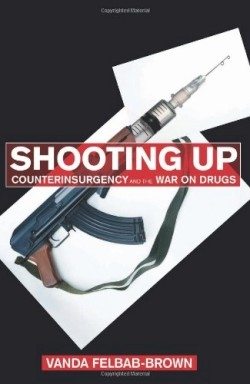Shooting Up
Counterinsurgency and the War on Drugs
The extensive field research of Felbab-Brown, a fellow at the Brookings Institution, involved copious interviews with farmers and government officials enmeshed in narcotic and counter-narcotic activity against such cartels as Peru’s Shining Path and Colombia’s K-19. Her scholarship and research are grounded in hard facts, making Shooting Up a user-friendly text for foreign policy pundits as well as lay readers. For example, Felbab-Brown points out that the poverty endemic to countries where illegal drug manufacturing and exportation constitutes more than half of the country’s illicit GDP has created “narco-states,” such as Afghanistan, which supplies more than ninety-five percent of the market for opiates in Europe.
What unfolds as a result of her research is a radical critique of the attempts of countries such the US and Britain to institute premature eradication campaigns. Felbab-Brown warns against this approach as a proven disaster for the millions of citizens who rely on harvesting poppy, coca, or marijuana for their livelihood. One Afghan farmer on his post-Taliban country remarks, “Â…the governments that control Karzai, the American and the British, are cruel. They freed us from one evil, and now they have delivered us into another one.” Crop-substitution, while largely unsuccessful to date, is one way foreign aid is being spent to promote an agricultural base not dependent on terrorist activity.
Many drug lords are lionized by the local population: the late Pablo Escobar is remembered as a man who distributed groceries to the poor and built soccer stadiums. Escobar and groups such as FARC (Fuerzas Armadas Revolutionarias de Colombia) gain political capital among rural populations by protecting farmers’ harvests of illicit crops (which guarantee a living wage), while showing a marked interest in creating social infrastructures such as schools and roads.
For those unaware of the extent to which the war on drugs runs parallel to the war on terrorism, the vast financial resources committed by the US government, and the various strategic approaches employed thus far to disable narco-states (including eradication, suppression, and laissez-faire), Shooting Up is a meticulous, albeit condensed, account of the last twenty years of this failed war. One result of this necessarily compressed treatment of the international war on drugs: the author mentions only in passing the question of demand versus supply.
The book ends on a relatively positive note: this deadlocked conflict on drugs may be showing signs of reversal. “After years ofÂ…being doggedly wedded to ineffective and counterproductive counternarcotics policiesÂ…the counternarcotics strategy of the Obama administration for Afghanistan finally shows a capacity for learning at the government level.” (January) Virginia Konchan
Disclosure: This article is not an endorsement, but a review. The publisher of this book provided free copies of the book to have their book reviewed by a professional reviewer. No fee was paid by the publisher for this review. Foreword Reviews only recommends books that we love. Foreword Magazine, Inc. is disclosing this in accordance with the Federal Trade Commission’s 16 CFR, Part 255.

